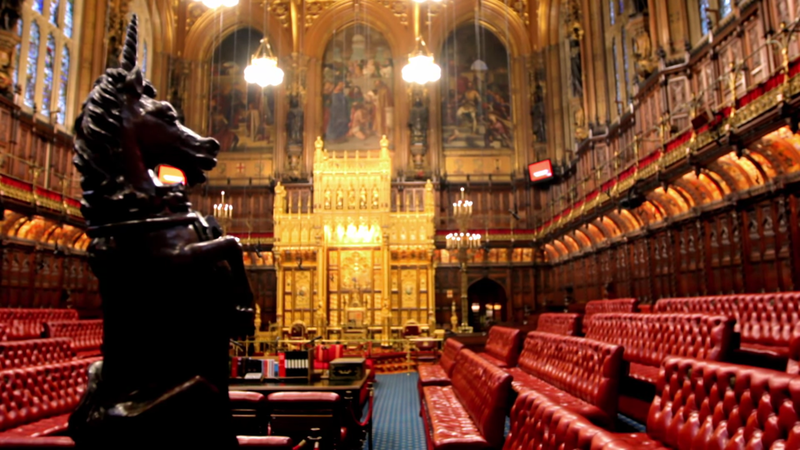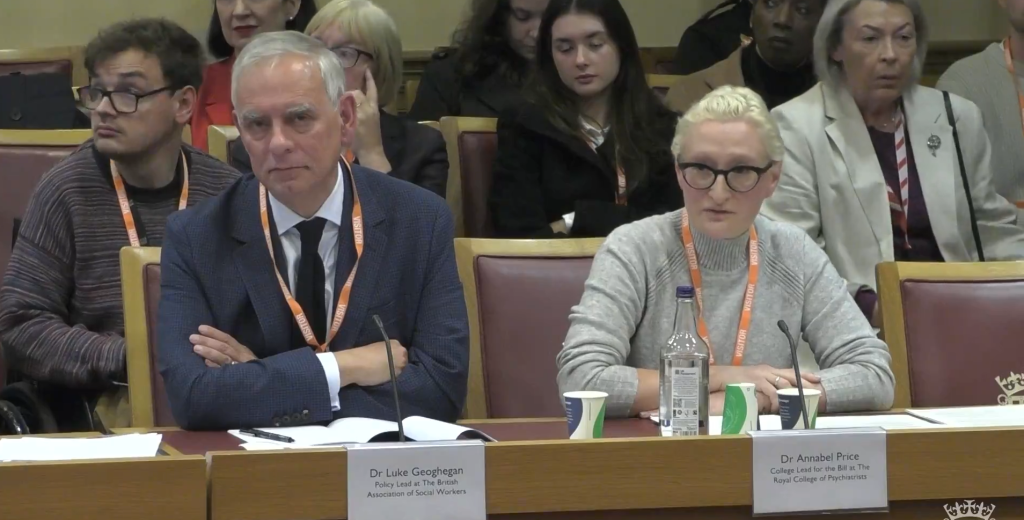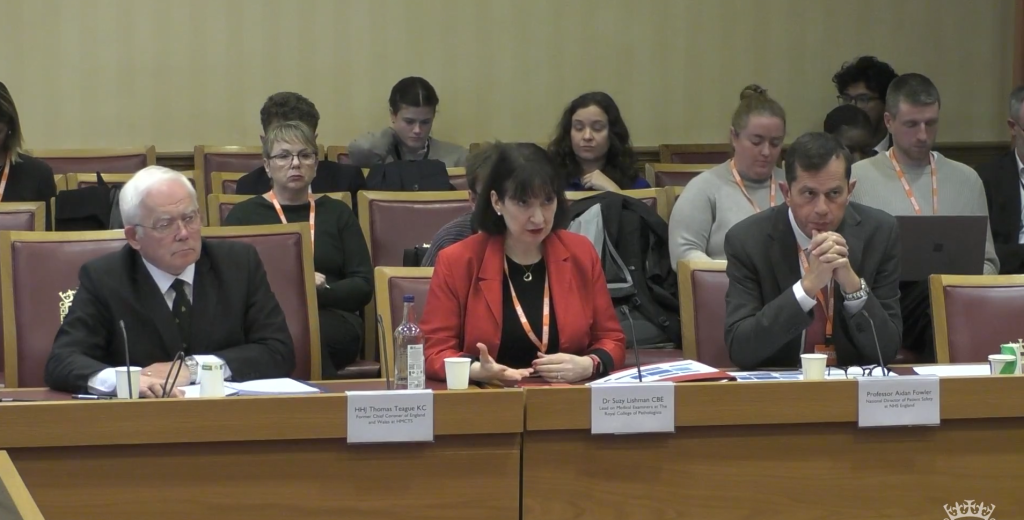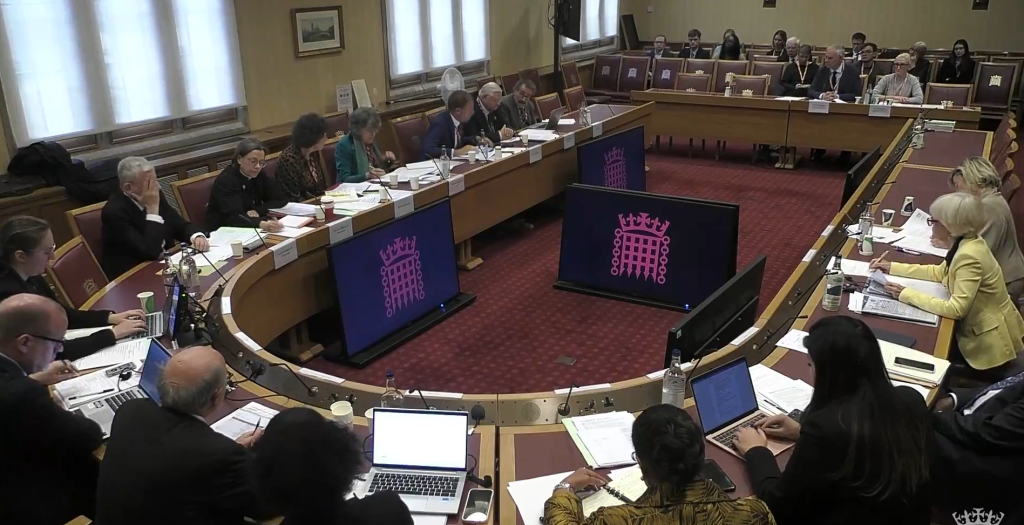 The House of Lords Select Committee on the Terminally Ill Adults (End of Life Bill) held their second day of oral evidence, where it heard evidence from the Royal College of Psychiatrists (RCPsych) and British Association of Social Workers, and then held a session focused on the role of coroners and medical examiners in assisted deaths.
The House of Lords Select Committee on the Terminally Ill Adults (End of Life Bill) held their second day of oral evidence, where it heard evidence from the Royal College of Psychiatrists (RCPsych) and British Association of Social Workers, and then held a session focused on the role of coroners and medical examiners in assisted deaths.
It has been reported that the committee is weighted against assisted dying, with more opponents of legislative change than supporters. And Humanists UK and My Death, My Decision analysis suggests that, apart from the Bill sponsors, the experts so far called to give evidence consist only of those who are neutral or opposed to the current Bill.
Royal College of Psychiatrists challenged
Ahead of the session, a senior professor of old-age psychiatry has branded the Royal College of Psychiatrists’ (RCPsych) approach to the Assisted Dying Bill ‘inconsistent with the college membership’. Baroness Elaine Murphy, a prominent medical member of the House of Lords, has added her voice to a growing number of RCPsych members, including a former college president and vice-president, in voicing concerns and distancing themselves from the de facto opposition stance taken by their professional medical body.
The Royal College of Psychiatrists officially has a neutral position on assisted dying, following a 2024 survey of 1,474 members that showed an equal proportion of membership (45%) supported and opposed the proposed legislation. But despite this neutral position, the college has become increasingly critical of the legislation, and has distributed briefings and made media interventions opposing the Bill.
Ahead of the session, Baroness Murphy, senior professor of old-age psychiatry, said:
‘It is, after all, perfectly possible for the college to have a neutral stance and yet to criticise certain aspects of the Bill, as indeed we all do. However, recent college briefings and statements are totally inconsistent with the college members’ wishes to be neutral on the fundamental principles, and some of their statements are plain wrong.
‘It reflects a small group of college officers who are determined to undermine members’ wishes by opposing the Bill.’
 During the session, Dr Annabel Price, College Lead for the Bill at Royal College of Psychiatrists, was challenged by Committee members about the College’s recent arguments against assisted dying. Lord Markham raised concerns, saying:
During the session, Dr Annabel Price, College Lead for the Bill at Royal College of Psychiatrists, was challenged by Committee members about the College’s recent arguments against assisted dying. Lord Markham raised concerns, saying:
‘The membership is split 50/50 in terms of those who are in favour and those who are against, and I’ve been approached by a number of members of the college who feel that the approach that their views are not being represented in here. I know there are a number of psychiatrists who feel that the Mental Capacity Act is a perfectly adequate way of assessing mental capacity [for assisted deaths] in their professional opinion.’
Dr Price replied, ‘We have thought very carefully through our position and our views, and we ask for a review of the Mental Capacity Act’s suitability… This isn’t a framework that has been tested for this particular decision… Should there be a presumption of capacity for this decision?’
Where do the other Royal Colleges and medical bodies stand on assisted dying?
One of the biggest differences between now and the 2015 Assisted Dying Bill is that all of the Royal Colleges have ended their opposition to assisted dying and moved to a position of neutrality. The British Medical Association (BMA) also ended their opposition and moved to a neutral position in 2021.
What else happened in the first session?
Later in the session, Lord Winston mentioned his upbringing in a deeply religious orthodox Jewish community and told the committee how he abstained during an assisted dying vote because he felt he couldn’t impose his views on others. He asked the panel, ‘We are legislating for society, for everybody not just for certain people – do you think in a pluralistic society we have the right to impose our particular views on society in general when we are legislating?’
Luke Geoghegan, Policy Lead at British Association of Social Workers, replied:
‘No, we don’t have the right to impose views. I think the issue is that if Parliament decides to legislate on assisted dying, it’s something that people have to opt in to. It’s quite a rigorous process, and it should be quite a rigorous process.
‘It is a choice. We exercise choices as a whole level society… This is the most fundamental choice. So long as we are not forcing people into it.’
Should Medical Examiners or Coroners be involved after the assisted death?
 The second session focused on a technical clause of the Bill, clause 38, which relates to the investigations of deaths after an assisted death. The evidence focused on whether a coroner or a medical examiner should investigate all assisted deaths.
The second session focused on a technical clause of the Bill, clause 38, which relates to the investigations of deaths after an assisted death. The evidence focused on whether a coroner or a medical examiner should investigate all assisted deaths.
Dr Suzy Lishman, Lead on Medical Examiners at Royal College of Pathologists, told the Committee:
‘I believe there’s a misunderstanding about the role of the coroner in the investigation of deaths. Many people believe that it involves a post-mortem, a long, drawn-out inquiry, perhaps an inquest with a jury and witnesses and can cause delays and distress for families. But that is not the case; around a third of all deaths are already referred to the coroner. 175,000 deaths in 2024 were notified to the coroner, but only a small proportion of those had a post-mortem, under 50%. And it is entirely possible for deaths to be investigated by the coroner without a post-mortem examination. The coroner does much more than just look at the medical cause of death.’
HHJ Thomas Teague KC, Former Chief Coroner of England and Wales at His Majesty’s Courts and Tribunals Service, was pressed by a Committee member whether the word ‘pressure’ was adequately defined in the Bill. The Bill introduces a new offence for pressure and coercion with up to life in prison. He told the Committee:
‘We would apply the dictionary definition, it’s a very common English word, if it became an issue, you would just look it up. It’s broader than coercion… Frankly, I’m not sure it would [need further defining], the fundamental principle lawyers apply is the dictionary definition.’
Professor Aidan Fowler, National Director of Patient Safety at NHS England, told the Committee:
‘Should Parliament decide to pass this bill, NHS England will work with the Government to support implementation of the service as required. If Parliament decides that assisted deaths should be certified in the same way as natural deaths, NHS England and Government will work with the medical examiner profession to enable adequate numbers of the workforce to be appropriately trained and supported to support this new legislation and its potential operational impacts.’
 Who else will provide evidence?
Who else will provide evidence?
The committee will take three further days of oral evidence. The sessions on Wednesday 29 October will focus on social and palliative care and the session on Thursday 30 October will focus on mental health, safeguarding and disability. The focus of the Wednesday 5 November has not yet been published. My Death, My Decision and Humanists UK are calling for at least one session to be dedicated to the experiences of terminally ill adults.
What happens next?
The Select Committee will not produce a report or make recommendations, but will take and publish oral evidence. The Select Committee will conclude by 7 November, and the Bill will then progress to its Committee Stage for detailed line-by-line scrutiny.
The Bill will need to complete its passage through parliament by Spring 2026.
Richy Thompson, Director of Public Affairs at Humanists UK, said:
‘Psychiatrists have a vital role in safeguarding decision-making, and many are willing to help do exactly that. We urge RCPsych to honour the neutral position its members voted for, engage constructively with the Select Committee, and ensure people nearing the end of life are treated with dignity, autonomy, and care.
‘When it comes to assisted dying, the status quo is unworkable; it leads to unnecessary suffering, painful suicides, and people fleeing their own country to take control of their deaths. This is a stark contrast to the many jurisdictions that have legalised assisted dying and offer a safe, compassionate choice for the terminally ill.’
Dave Sowry, Board Member of My Death, My Decision, said:
‘Today’s session builds on the enormous body of evidence that proves that the Assisted Dying Bill is the most intensely scrutinised legislation this Parliament has ever seen. It adds to the 2024 parliamentary inquiry, which received 68,000 responses from the public, 389 submissions of written evidence and held three days of oral evidence sessions; As well as the House of Commons Bill committee this year received 444 submissions of written evidence and held five oral evidence sessions, hearing from 50 witnesses.
‘We hope the Select Committee takes evidence from the most important people this debate is centred around, the terminally ill, as was suggested by the committee yesterday. We cannot understand how members of the House of Lords can take further evidence about the Terminally Ill Adults Bill without hearing from terminally ill adults. People who are dying deserve to be heard, they deserve the right to make decisions about the end of their lives, and they deserve autonomy, dignity and compassion.’
Notes
For further comment or information, media should contact Nathan Stilwell at nathan@humanists.uk or phone 07456 200033. (media only)
Humanists UK is making the following photos available to the media to use – credit to Simona Sermont/Humanists UK – 1, 2, 3, 4, 5.
Humanists UK and My Death, My Decision have people and their loved ones who would be affected by this change available for the press.
If you have been affected by the current assisted dying legislation, and want to use your story to support a change in the law, please email campaigns@humanists.uk.
Humanists defend the right of each individual to live by their own personal values, and the freedom to make decisions about their own life so long as this does not result in harm to others. Humanists do not share the attitudes to death and dying held by some religious believers, in particular that the manner and time of death are for a deity to decide, and that interference in the course of nature is unacceptable. We firmly uphold the right to life but we recognise that this right carries with it the right of each individual to make their own judgement about whether their life should be prolonged in the face of pointless suffering.
We recognise that any assisted dying law must contain strong safeguards and the international evidence from countries where assisted dying is legal shows that safeguards can be effective. We also believe that the choice of assisted dying should not be considered an alternative to palliative care, but should be offered together as in many other countries.
Humanists UK is the national charity working on behalf of non-religious people. Powered by over 150,000 members and supporters, we advance free thinking and promote humanism to create a tolerant society where rational thinking and kindness prevail. We provide ceremonies, pastoral care, education, and support services benefitting over a million people every year and our campaigns

